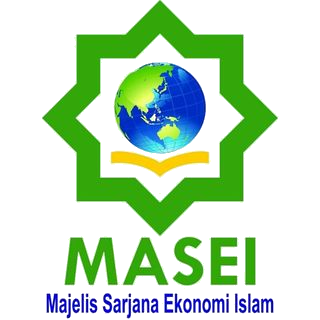Building A Synergy Between The Halal Industry And The Green Industry In The Maqasid Syari'ah Review As The Basis Of Islamic Economics
Achmad Fageh(1*)(1) UIN SUNAN AMPEL SURABAYA
(*) Corresponding Author
Abstract
Keywords
Full Text:
PDFReferences
Ab Talib, M. S., Hamid, A. B. A., & Zulfakar, M. H. (2015). Halal supply chain critical success factors: A literature review. Journal of Islamic Marketing. https://doi.org/10.1108/JIMA-07-2013-0049
Al-Ghdabi, R. R., Almomani, R. Z. Q., & Banyhamdan, K. M. (2019). Impact of the green supply chain management practices on the corporate image of chemical industries in Jordan. International Journal of Scientific and Technology Research, 8(12), 2546–2554.
Ali, Z. (2016). Metode Penelitian Hukum (Badan Pene). Sinar Grafika.
Alrasyid, M. H. (2016). Environmental Strategic Management Untuk Kawasan Industri Hijau. IJEEM - Indonesian Journal of Environmental Education and Management, 1(1), 101–116. https://doi.org/10.21009/ijeem.011.07
Atmawinata, A., Diawati, L., Adlir, A., Susilo, Y., Radjid, W., Massaruddin, Juli Ardika, P., Sudrajat, H., Indarto Sutjiatmo, A., Prayogo, H., Prabowo Sutjiatmo, B., Kurniawan, D., Karyadi, A., & Purwantini, P. (2011). Kedalaman Struktur Industri yang Mempunyai Daya Saing di Pasar Global. 1–334.
Departemen Agama RI. (2020). Al Quran dan terjemahan.
Khan, A. N. K. and I. A. (2014). Academic Role of a Principal and Continuous Professional Development. Journal of Education and Human Development, 03(02).
Masruri. (2014). Analisis Efektifitas Program Nasional pemberdayaan masyarakat mandiri perkotaan. Akademia Permata.
Menita, H. A. (2017). PEMIKIRAN ABDUL MANNAN TENTANG EKONOMI ISLAM. Al-Intaj.
Rasyid, H. Al. (2017). Pengaruh Kualitas Layanan Dan Pemanfaatan Teknologi Terhadap Kepuasan Dan Loyalitas Pelanggan Go-Jek. Jurnal Ecodemica: Jurnal Ekonomi, Manajemen, Dan Bisnis. https://doi.org/10.31311/jeco.v1i2.2026
Rohmati, D., Anggraini, R., & Widiastuti, T. (2018). Maqāṣid al-Sharī‘ah sebagai Landasan Dasar Ekonomi Islam. Economica: Jurnal Ekonomi Islam, 9(2), 295. https://doi.org/10.21580/economica.2018.9.2.2051
Rosowulan, T. (2019). Konsep Manusia dan Alam Serta Relasi Keduanya dalam Perspektif Al-Quran. Cakrawala: Jurnal Studi Islam. https://doi.org/10.31603/cakrawala.v14i1.2710
sadono sukirno. (2013). Makroekonomi: Teori Pengantar. Rajawali Pers.
Sugiyono. (2017). Metode penelitian pendidikan pendekatan kuantitatif, kualitatif, dan R&D. cv. Alfabeta.
Sulistiani, S. L. (2018). Analisis Maqashid Syariah Dalam Pengembangan Hukum Industri Halal ل ل ح ضر ۡ ِ ا م ِ م او ك سا لنٱ ا ه ي أ ي و ه ن ِ إ ن ِ و ط خ او ع ِ ب ت ت ل و ا ب ِ ي ط ۚ ِ ط ي شلٱ ۡ ت ِ ء و ر م أ ي ا م ن ِ إ ١٦٨ ين ِ ب م و د ع م ك ل ل ع ت. 3, 91–97.
UU. No 3. (2014). Undang-Undang No 3 tahun 2014 Tentang Perindustrian. In Cell.
Waharini, F. M., & Purwantini, A. H. (2018). Model Pengembangan Industri Halal Food di Indonesia. Muqtasid: Jurnal Ekonomi Dan Perbankan Syariah, 9(1), 1. https://doi.org/10.18326/muqtasid.v9i1.1-13
Yeni Rohaeni, & Ahmad Hidayat Sutawijaya. (2020). Pengembangan Model Konseptual Manajemen Rantai Pasok Halal Studi Kasus Indonesia. J@ti Undip : Jurnal Teknik Industri, 15(3), 177–188. https://doi.org/10.14710/jati.15.3.177-188
Article Metrics
Abstract view(s): 673 time(s)PDF: 616 time(s)
Refbacks
- There are currently no refbacks.















